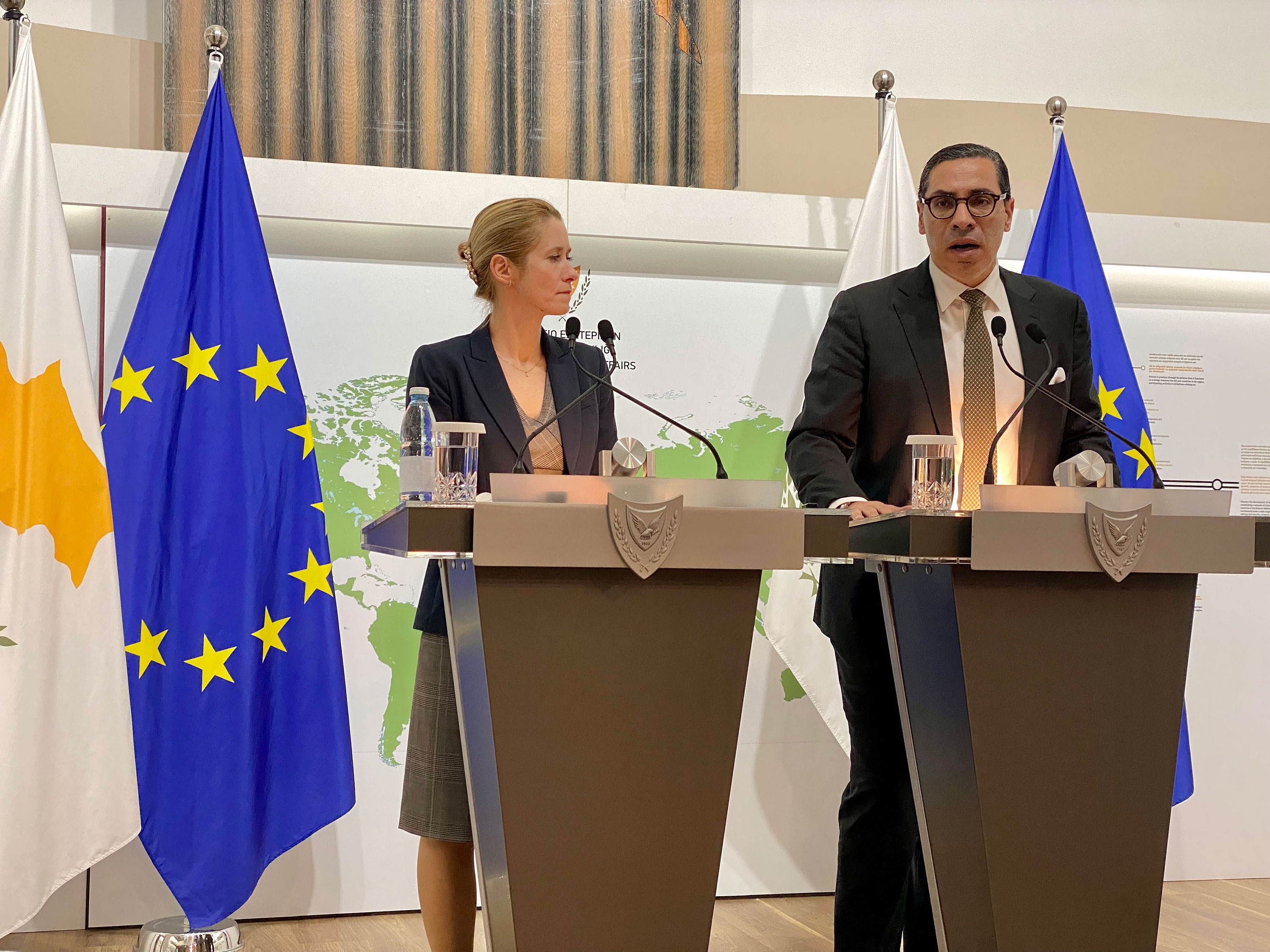It is neither Turkey nor the EU that will govern the island of Cyprus in the future, but the people themselves, the EU’s foreign policy chief Kaja Kallas said on Wednesday evening, reiterating the EU’s full support to the UN-led process for a solution of the Cyprus problem.
Speaking at a joint press conference with Foreign Minister Constantinos Kombos in Nicosia, Kallas said the Cyprus problem was “a core matter for the European Union-Turkey relations and for the stability and security of the Eastern Mediterranean”.
“It is neither Turkey nor the EU that will govern the island of Cyprus in the future. It is the people of Cyprus, the Greek and Turkish Cypriots, who must live together and find solutions to common challenges,” she pointed out.
Kallas added that the two communities needed a “sustainable solution”.
“We have positive engagement with Turkey in areas of common interest,” Kallas said, adding that she discussed the issue with Kombos.
Turkey remains “a key partner of the European Union and a significant regional actor”, she pointed out.
“I am confident that our cooperation will continue to strengthen Europe’s stability and security,” she said, adding that Turkey’s EU accession process has frozen since 2018, due to the deterioration of democratic standards, judicial independence and fundamental rights.
Asked whether Turkey could be a part of the EU’s defence architecture, especially after the issues raised in the European Commission’s latest report on Turkey, she said that “we are trying to boost our own defence industry, but at the same time all the member states are increasing their spending and when the defence industry is not ready that means also that some of the components have to be procured outside.”
“We also have worries with the way Turkey is operating in many of the fields that the concerns of member states have, so these are all taken into account,” she added.
Regarding Turkey’s EU accession bid, Kombos said “the EU-Turkey relation is full of potential” and that “there are so many choices that have been created and available to Turkey”.
“The choices exist, but Turkey needs to make a decision,” he said, explaining that “the decision of Turkey needs to make in relation to its future relationship with the EU, is one that passes necessarily through Cyprus.”
Kombos also referred to the arrest of five Greek Cypriots in the north, who are being held since July 19. “We are asking for EU support in applying the necessary pressure,” he said.
Regarding the situation in the Middle East, Kallas said “Cyprus is the closest we can get to Gaza from the European Union, just an hour away” and that “the stability of Gaza is essential to Cyprus as well as it is for Europe”.
She said the EU is still the main financial contributor in aid delivery and thanked Cyprus for its efforts in delivering aid through the Amalthia maritime corridor.
“This is a clear example of how the European Union and the member states can build on each other’s added value,” she said. “The EU has also been a consistent supporter of the Palestinian Authority, keeping the prospect of a two-state solution alive,” Kallas added.
Regarding the reconstruction of Gaza, Kallas said the European Commission began working on the proposal put forward by US President Donald Trump, adding that “a lot of points were really the same as Cyprus plan, so this is also something that we have been discussing and seeing what more can we do”.
Kombos said “we need to work to make this plan realistic and secure”, adding that “the EU needs to be actively involved in this, needs to be present, and the EU should not be seen as merely a financier”.
“Cyprus has its own approach, based on its own capacities and capabilities, in relation to the humanitarian front, in relation to reconstruction, and also in relation to security,” he added.
“Our contacts, network and efforts are at the disposal of the European Union to carry out this plan personally,” he said.
Kombos also said that this week a vessel from Cyprus carrying 1,000 tonnes of aid for Gaza reached Ashdod port.
The discussion also included Syria, Kallas said. “The coming year will be important to consolidate support to the country and ensure stability in the region. I know that this is also an important topic for Cyprus and I will ensure it stays high on the agenda, including for our discussions among the foreign ministers,” she added.
Regarding Syria, Kombos said “we agree that we need to do a lot more to ensure the recovery and support the recovery for the Syrian people” and reaffirmed Cyprus’ willingness to contribute in every way possible.
Referring to Ukraine, Kallas said the EU was the country’s largest supporter and that in order “to push Russia back, Europe must continue to step up.”
Kombos said they reiterated “our full solidarity and our steadfast support in our unwavering commitment to the sovereignty and territorial integrity of Ukraine”, an approach “dictated” by Cyprus’ experience after the 1974 Turkish invasion.
The foreign minister added that the path for accession to the EU supported the resilience and future security of Ukraine. “Your approach in relation to Ukraine is an example of leadership and it is a leadership that cannot and does not have double standards,” Kombos said, addressing Kallas.
Kallas also signed the foreign ministry’s visitors book, mentioning Cyprus assuming the EU rotating presidency in January 2026. “We are counting on you to keep us moving forward as a Union, while we tackle urgent challenges. Looking forward to working together. We have a lot to do,” she wrote.






Click here to change your cookie preferences